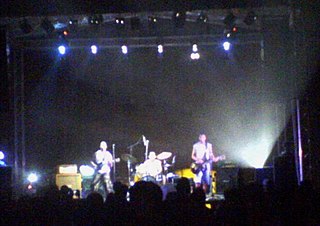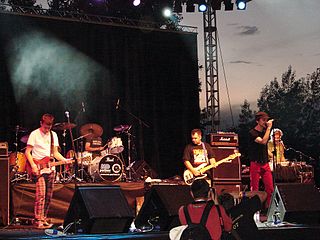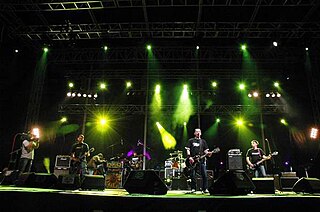History
The band was formed in 1986 by Predrag Drčelić "Skaki" (vocals) from Gornji Milanovac with KBO! member Saša Vujić "Vuja" (guitar), whom he met at the Faculty of Law where they both had studied, and his brother Slobodan Vujić "Boban" (drums). The band started recording a series of demo recordings at the improvised Češnjak Studio without any idea of later releasing. However, the selected recordings made until 1988 were released on their debut, self-released, album Trula Koalicija. Among the demo recordings were also "Berlinski čovek" ("Berlin Man") and "Prijatelj da budeš" ("Be a Friend"), featured in the 1987 compilation Les Phantoms De Nuit (Phantoms of the Night) released by Phantom Tapes, an underground label run by Predrag Petrović and the song "Bila je nežna kao cvet" ("She Was as Gentle as a Flower") appeared on the Produkcija Pogledi compilation U Jugoslaviji sve je dobro (In Yugoslavia Everything Is Fine). [1]

KBO! is a Serbian punk rock band from Kragujevac. They are one of the first hardcore punk acts on the former Yugoslav punk scene. Since the very beginning, the band accepted the DIY ethic by forming their own record label KBO! Records, through which they have released all their official releases. The band have toured across several European countries including Hungary, Austria, Greece, Belgium and Netherlands and shared the stage with acts such as Gorilla Biscuits, Babes in Toyland. They released several studio and live albums, some of them for foreign record labels and were included in numerous international punk compilations featuring eminent bands.

Berlin is the capital and largest city of Germany by both area and population. Its 3,748,148 (2018) inhabitants make it the second most populous city proper of the European Union after London. The city is one of Germany's 16 federal states. It is surrounded by the state of Brandenburg, and contiguous with its capital, Potsdam. The two cities are at the center of the Berlin-Brandenburg capital region, which is, with about six million inhabitants and an area of more than 30,000 km², Germany's third-largest metropolitan region after the Rhine-Ruhr and Rhine-Main regions.

Yugoslavia was a country in Southeastern and Central Europe for most of the 20th century. It came into existence after World War I in 1918 under the name of the Kingdom of Serbs, Croats and Slovenes by the merger of the provisional State of Slovenes, Croats and Serbs with the Kingdom of Serbia, and constituted the first union of the South Slavic people as a sovereign state, following centuries in which the region had been part of the Ottoman Empire and Austria-Hungary. Peter I of Serbia was its first sovereign. The kingdom gained international recognition on 13 July 1922 at the Conference of Ambassadors in Paris. The official name of the state was changed to Kingdom of Yugoslavia on 3 October 1929.
The album was soon followed by two more albums, Sećanja (Memories), released in 1989, and Ne izlazi iz stroja (Don't Leave the Array), released in 1990, recorded, produced and released in the same manner as the debut. By the time the third album was released, the band had increased its popularity and had well received live appearances. It was at that time that the band decided to add a bass player, Dragan Cvetanović "Ceja", also from KBO!, with whom the band recorded their fourth album Plakao sam kad je pala Sekuritatea (I Cried When the Securitate Had Fallen), recorded at the Male Pčelice Studio on September 17 and 18, 1992. [2] The album featured politically explicit songs "Zašto me mrziš što volim Šešelja" ("Why Do You Hate Me for Loving Šešelj") and "Rodi mi gomilu debila" ("Deliver Me a Bunch of Morons"), and cover versions of Bajaga i Instruktori song "Tišina" ("Silence") but with altered lyrics, entitled "Alkoholičarka" ("Alcoholic Girl") and "Ti" ("You") which featured music taken from a Bad Religion song. [2] The album was well received by the public, selling in about two thousand copies, partially owing to the album cover, designed by Vidan Papić, which featured a combination of the Communist Red Star and the flag of the Nazi Party.

The Securitate was the popular term for the Departamentul Securității Statului, the secret police agency of the Socialist Republic of Romania. Previously, before the communist regime, Romanian secret police was called Siguranța Statului. It was founded on 30 August 1948, with help from the Soviet NKVD, while Romania was practically under the Red Army's occupation. Following the overthrow of Nicolae Ceaușescu in 1989, the DSS lived on until 1991, when Parliament approved a law reorganizing the DSS into various subdivisions.

Vojislav Šešelj is a Serbian politician, writer and lawyer. He is the founder and president of the nationalist Serbian Radical Party (SRS). From 1998 to 2000, he was Deputy Prime Minister of Serbia.

Bajaga i Instruktori are a Serbian and former Yugoslav rock band. Founded in Belgrade in 1984 by composer, lyricist and guitarist Momčilo Bajagić "Bajaga", the group possesses a rich discography and a plethora of hit songs that placed them at the top of the former Yugoslav rock scene, alongside other mega-selling bands such as Bijelo Dugme and Riblja Čorba.
The band released their sixth album Pogled u nebo (A Look at the Sky) in 1994 featuring ten songs, including a cover version of Piloti track "Kao ptica na mom dlanu" ("Like a Bird on My Palm") with altered lyrics, entitled "Kao pile na mom panju" ("Like a Chicken on My Stump"). [3] The following year, the band performed at the ZGAGA festival in Slovenia, however, their appearance ended after about fifteen minutes of performance, due to a motorcycle gang interruption. In the meantime, in 1996, the band released a live album, Live at KST, and in 1998, the band appeared on the live various artists compilation Svi protiv svih (Everybody against Everyone) with three songs, "Vrsta" ("Species"), "Američki san" ("The American Dream") and "Ti" ("You"), released by Hi-Fi Centar. During the same year, the band recorded their sixth studio release, Ubiće nas promaja (Draft Will Kill Us), released through Češnjak Records, the first one to be released on CD, as the other albums were released on compact cassettes only. The band recorded a promotional video for the song "Američki san", which is a cover version of the Bad Religion song "American Jesus". The song also appeared on the Hi-Fi Centar various artists compilation YU rock 2000 in 2000. [4] Two years later, the band disbanded.

Piloti is a Serbian rock band from Belgrade. Formed in 1981, and initially immersed in the Yugoslav new wave scene, the band later moved towards mainstream pop rock, they came to prominence in the 1980s and early 1990s as one of the leading pop rock acts in former Yugoslavia. The band disbanded in 1997, only to be reformed in 2009 under the name Kiki Lesendrić & Piloti.

Slovenia, officially the Republic of Slovenia, is a sovereign state located in southern Central Europe at a crossroads of important European cultural and trade routes. It is bordered by Italy to the west, Austria to the north, Hungary to the northeast, Croatia to the southeast, and the Adriatic Sea to the southwest. It covers 20,273 square kilometers (7,827 sq mi) and has a population of 2.07 million. One of the successor states of the former Yugoslavia, Slovenia is a parliamentary republic and a member of the United Nations, of the European Union, and of NATO. The capital and largest city is Ljubljana.

Hi-Fi Centar was a record label based in Belgrade, Serbia.
In 2005, having been inactive for four years, the band was reformed, with a new bassist, Boneyard member Dule. The band also started working on new material, presenting it with a new single, "Mali mozgovi" ("Little Brains"). In 2009, Drčelić left the band, being replaced by Pakost i Ukor Gladne Godine vocalist Miloš Topalović "Topalko". [5]
At the end of 2014, the band released the single "Dosada" ("Boredom"), announcing the new studio album, expected to be released in 2015. [6]






















